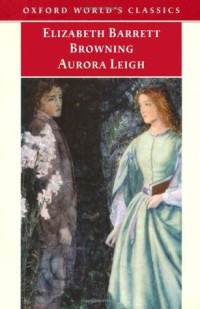For what is lightness but inconsequence
 Aurora Leigh
Aurora Leigh
by Elizabeth Barrett Browning
Yes, I read an epic poem, or novel in verse, and it wasn’t just to tick something off my Classics Club list. I really like Browning and had been meaning to read this for years.
Aurora Leigh is born in Italy but when her beloved parents die she is sent to England to be raised by her aunt. At every step she chooses her own way in a manner that to a modern reader might appear progressive and feminist. She is self-taught (aside from a few years when she is taught by her aunt) and chooses her career over a man; she argues for the contributions of women to the arts, and poetry in particular. From the day Aurora declines a marriage proposal because her suitor denigrates her chosen career and her gender, I was in love with her.
“We get no good / By being ungenerous, even to a book, / And calculating profits – so much help / By so much reading. It is rather when / We gloriously forget ourselves and plunge / Soul-forward, headlong, into a book’s profound, / Impassioned for its beauty and salt of truth – / ‘Tis then we get the right good from a book.”
While there is clearly a political/social agenda to this story, it’s not overly serious. There is plenty of humour, especially in the middle where Aurora is establishing her career and Browning gently mocks critics and writers alike. There’s a very funny section criticising different types of literature and why Aurora won’t write anything but poetry. But the harshest mockery is saved for Aurora’s cousin Romney, a do-good social reformer whose earnest Christianity is matched only by Aurora’s own more private Christian faith. (The religious element was sometimes too much for my taste.)
“For what is lightness but inconsequence, / Vague fluctuation ‘twixt effect and cause / Compelled by neither? Is a bullet light, / That dashes from the gun-mouth, while the eye / Winks and the heart beats one, to flatten itself / To a wafer on the white speck on a wall / A hundred paces off?”
This took me months to read but it rewarded devoting chunks of time to, as getting into the rhythm helped transport me to that world, allowing me to both forget that it was a poem and at the same time appreciate the poetry. It’s sometimes slow story-wise and I wouldn’t call it gripping but it is always beautiful.
At its heart this is a romance, reminiscent of Jane Austen or Charlotte Bronte. As this became clear, I lost a little love for it as a political statement, but it did become a more satisfying story.
“If… / They had burnt, instead, a star or two of those / We saw above there just a moment back, / Before the moon abolished them – destroyed / And riddled them in ashes through a sieve / On the head of the foundering universe – what then? / If you and I remained still you and I, / It could not shift our places as mere friends.”
First published 1856.
Source: Present from my Dad.
Challenges: Read for the Classics Club.